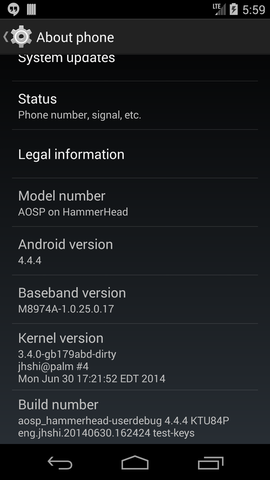Google has a fair document for building kernel for Android. Yet it
didn't cover how to integrate the kernel with AOSP source tree so that kernel
gets built along with whole platform, which I'll explain in this post. Here I'll
mainly focus on android-4.4.4_r1 (Kitkat) for Nexus 5 (hammerhead).
The instructions should be easy to adapt to other models or AOSP releases.
Determine Kernel Version
The best and safest way to determine the right kernel version you need is to
examine the pre-included kernel image. For hammerhead, it's in
device/lge/hammerhead-kernel/.
$ bzgrep -a 'Linux version' device/lge/hammerhead-kernel/vmlinux.bz2
Linux version 3.4.0-gd59db4e (android-build@vpbs1.mtv.corp.google.com) (gcc version 4.7 (GCC) ) #1 SMP PREEMPT Mon Mar 17 15:16:36 PDT 2014
As per this stackoverflow thread, the commit hash you want is d59db4e
part from the version name, without leading g.
Download the Sources
For hammerhead, the kernel sources lie in msm tree. After cloning it into
kernel directory, checkout the commit hash you found in above step.
$ git clone https://android.googlesource.com/kernel/msm.git kernel
$ cd kernel
$ git checkout d59db4e
Adapt kernel/AndroidKernel.mk
Two changes need to be made for kernel to be successfully built in-tree.
- Use
zImage-dtbinstead ofzImageas target.
First, change TARGET_PREBUILT_INT_KERNEL (~line 8).
-TARGET_PREBUILT_INT_KERNEL := $(KERNEL_OUT)/arch/arm/boot/zImage
+TARGET_PREBUILT_INT_KERNEL := $(KERNEL_OUT)/arch/arm/boot/zImage-dtb
Then change corresponding make rule (~line 47).
$(TARGET_PREBUILT_INT_KERNEL): $(KERNEL_OUT) $(KERNEL_CONFIG) $(KERNEL_HEADERS_INSTALL)
- $(MAKE) -C kernel O=../$(KERNEL_OUT) ARCH=arm CROSS_COMPILE=arm-eabi-
+ $(MAKE) -C kernel O=../$(KERNEL_OUT) ARCH=arm CROSS_COMPILE=arm-eabi- zImage-dtb
- Do not build modules (~line 48-51).
- $(MAKE) -C kernel O=../$(KERNEL_OUT) ARCH=arm CROSS_COMPILE=arm-eabi- modules
- $(MAKE) -C kernel O=../$(KERNEL_OUT) INSTALL_MOD_PATH=../../$(KERNEL_MODULES_INSTALL) INSTALL_MOD_STRIP=1 ARCH=arm CROSS_COMPILE=arm-eabi- modules_install
- $(mv-modules)
- $(clean-module-folder)
Adapt device/lge/hammerhead Project
Next we need to tell the device to build kernel, instead of copying the
pre-built one. This patch should do the trick. Basically, a new
AndroidBoard.mk file is added to include the rules to build and copy kernel.
And some lines in device.mk related to kernel are removed, since it's already
taken care of in AndroidBoard.mk.
Build It!
After all above changes, do a make clobber to make sure we have a clean
slate, otherwise, some strange errors may strike you. Then just build AOSP in
normal way and kernel should get built on the fly.
Here is a snapshot of the kernel version I built. The version name is no longer
d59db4e because I made some changes.

Credits
Thanks to this blog from Jameson for describing most of it.
UPDATE
The above setup works fine as long as you didn't
specify a separate output directory, since we assume the kernel output
directory is ../$(KERNEL_OUT) in make options. Apparently, it will fail if the
out directory is not the default one.
The kernel Makefile support two ways of specify output directory
(see comments starting from line 79). One is to use O= command line option,
another is to set the KBUILD_OUTPUT environment variable.
Since we use -C option to first switch working directory, O= options is a
bit tricky to use, so we leverage the KBUILD_OUT variable.
We first figure out the absolute path of the KERNEL_OUT
FULL_KERNEL_OUT := $(shell readlink -e $(KERNEL_OUT))
Then we set KBUILD_OUT before calling make:
$(KERNEL_CONFIG): $(KERNEL_OUT)
env KBUILD_OUTPUT=$(FULL_KERNEL_OUT) \
$(MAKE) -C kernel ARCH=arm CROSS_COMPILE=arm-eabi- $(KERNEL_DEFCONFIG)
This way will work no matter where the actual AOSP output directory is.
UPDATE (09/03/2015)
As Ryan pointed out, for Mac users, you may need to install GNU
readlink, instead of the built-in one.